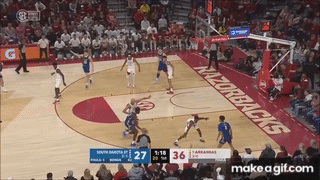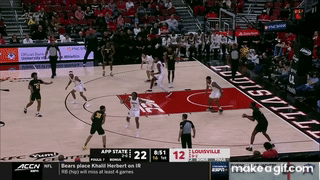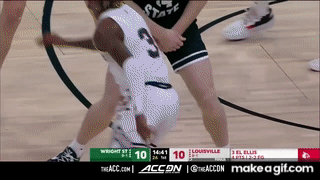Arkansas’ trip to the Maui Invitational starts with Louisville on Monday at 4 pm. The Razorbacks will play one of Creighton or Texas Tech in the second game.
The Hogs are keeping under wraps when Nick Smith will make his debut. It doesn’t sound like he’s practiced much – if at all – since the exhibitions wrapped up. If the Razorbacks want to win this tournament, they will likely need Smith, which means he needs to get his feet wet before the second-round game. If he’s good to go, I could see him come off the bench and play a few minutes in this one. If he doesn’t play against Louisville, I’d expect him to not play at all in this tournament.
Meet the Cardinals
Confused? Check out the advanced stats glossary to learn more about the stats cited here.
First-year coach Kenny Payne is off to an 0-3 start as Louisville is shaping up to be one of the worst power conference teams in the country. It’s taken several missteps for the once-proud Cardinals to get to this point.

The sudden end of the Rick Pitino era amid FBI and NCAA investigations left Louisville in chaos. However, things were looking up as Louisville managed to escape major sanctions and hire Xavier coach Chris Mack, a hire that was generally considered solid at the time. That hire didn’t end up working out, as both off-court issues (Mack was suspended for six games after he fired an assistant coach who was under investigation) and eventually on-court issues (the Cardinals were snubbed on Selection Sunday in 2021, then started 6-8 last year) doomed his tenure.
Eric Musselman was on many Louisville fans’ head coaching wish lists, but the Cardinals ended up making the obvious choice. An alum of the school and longtime assistant for John Calipari, Payne seemed like the perfect candidate. And he still may prove it, but the start isn’t great. Louisville largely struck out on the recruiting trail and in the transfer portal, leaving them with a 2023 roster filled with question marks.

It’s not ideal to be 0-3 with the 344th-best strength of schedule, but that’s where Louisville is. The overall numbers aren’t as bad because all of those losses were by exactly one point; basically, three dead-even games. Given the end of the App State game – Louisville’s game-winning shot was waved off because it was 0.1 seconds too late – I expect the Cardinals to fight hard, even if they appear overmatched.
Model pick: Arkansas 65, Louisville 51. Our pick is in line with Vegas, which opened the Hogs as 14.5-point favorites.
Projected starters
Louisville
- PG El Ellis, 6’3, 24.0 ppg
- SG Mike James, 6’5, 11.0 ppg
- CF Jae’Lyn Withers, 6’9, 10.7 ppg
- PF JJ Traynor, 6’8, 4.0 ppg
- PF Brandon Huntley-Hatfield, 6’10, 10.3 ppg, 8.7 rpg
That’s a tall lineup! The Cardinals’ first guy off the bench is also 6’8, so height isn’t a concern for this team. We’ll meet all these guys below.
Arkansas
- CG Ricky Council IV, 6’6, 18.7 ppg
- CG Devo Davis, 6’4, 12.7 ppg
- CG Anthony Black, 6’7, 6.0 ppg, 6.0 rpg
- SF Jordan Walsh, 6’7, 8.7 ppg
- PF Makhi Mitchell, 6’9, 7.0 ppg
Trevon Brazile would be the sixth man, and Musselman is still trying to figure out the final rotation spot, with Kamani Johnson and Jalen Graham apparently competing for it.
When Louisville has the rock

Louisville’s offense starts with El Ellis, their ball-dominant point guard. Ellis was a change-of-pace scorer off the bench last year, now he’s their biggest backcourt weapon on a team that really doesn’t have many backcourt weapons. Ellis has played 94% of Louisville’s minutes this season and has a monstrous 36% usage (that’s higher than JD Notae’s last year!), meaning that more than one-third of Louisville possessions involve Ellis shooting, getting to the line, or turning it over.
Ellis has good shot selection and is an efficient shooter (57% EFG) who is undone by a massive turnover rate (23%). Ellis is a steady 3-point threat (37% on 27 attempts), but he will routinely make hazardous throws or try to dribble into traffic and have his pocket picked. His overall grade of 69 is fourth-best on the team, and lower than five Razorbacks: Ricky Council IV, Makhi Mitchell, Jordan Walsh, Trevon Brazile, and Anthony Black.

The Cardinals have appeared tepid on offense all season and don’t get in transition very well, due at least in part to the lack of comfort with anyone other than Ellis controlling the ball. Opponents are likely going to be scared to run with the Hogs this year, but waiting for Arkansas to set up its halfcourt defense doesn’t usually end well either.
Despite not seeing much transition, the Razorbacks try to speed opponents up with ball pressure early in the shot clock. That scheme tends to work best against ball-dominant or turnover-prone point guards, and Ellis is very much both of those things. He might be in for a rough night if Louisville can’t find other guys to help him.

You can see Louisville’s shooting ability and also their big issue: creating shots. The Cardinals are extremely turnover-prone, with both starting guards and their highest-volume forward all posting turnover rates above 20%. Louisville’s shot selection is actually quite good: they don’t take too many midrange shots, instead getting open looks from 3 and shots at the rim at a decent rate. And they finish at the rim very well. Those are positive signs for Kenny Payne.
Arkansas allows a lot of shots at the rim by not helping underneath the basket. That helps the Razorbacks avoid kickouts and quick reversals for open 3-pointers. And besides, Razorback defenders are very good when left 1-on-1:

Louisville will need to win some of these 1-on-1 matchups to have a chance.
Personnel
After Ellis, Louisville’s only other high-usage shooter is 6’9 combo forward Jae’Lyn Withers, who is second on the team in scoring. Withers shoots well (64% EFG) but boasts a ridiculous 30% turnover rate. He’s also inconsistent: after two good games to open the season, he had zero points in a foul-out against Appalachian State.
Louisville is very short on scholarship guards. The other backcourt starter is Mike James, who leads the Cards in offensive rating (115.2) and effective field goal percentage (69%). He’s a bit turnover-prone (26%), but his main issue that he just doesn’t shoot enough: his usage is only 16% due to Louisville’s inability to consistently get him the ball in a scoring position. Sophomore transfer Hercy Miller, who averaged 2.0 points per game for Tennessee State last season, is their only other guard, and he’s just a minutes-filler. His offensive rating of 82.2 is quite bad, and he’s shooting just 30% EFG for the season.
The frontcourt is in better shape and includes Louisville’s best all-around player, Tennessee transfer Brandon Huntley-Hatfield, a 6’10 former four-star recruit who leads the Cardinals in overall grade (81), net points produced per 100 possessions (+4.2), and team plus-minus per 100 possessions (+15). He’s also tops on the team in offensive rating (120.0) and offensive rebounding rate (10%).
The other two forwards to watch are a pair of 6’8 guys, JJ Traynor and Sydney Curry. Both have very low usage rates and are primarily on the floor for defense and rebounding. At 270 pounds, Curry is a low-post mauler, but he turns the ball over at a whopping 43% rate, making him the Cardinals’ worst offensive option by a mile.
When Arkansas has the rock
Schematically, Louisville’s defense is going to be very similar to Arkansas’. Kenny Payne is running a very NBA style of defense too, which means man-to-man. The Cardinals will switch one through five to avoid giving up open 3-pointers, and then will offer limited help inside the arc to avoid easy kickouts.

Arkansas’ offense remains very much a work in progress, but a man defense that’s not going to force them to hit 3-pointers is a positive matchup.

The Razorbacks’ best offense is its defense: namely, turnovers creating fast breaks. The good news is that Louisville is the opposite: its offense actively hurts its defense because of the constant turnovers. The Razorbacks should have plenty of opportunities to get transition buckets off steals.
When forced into the halfcourt, Arkansas’ offense is not good right now. That chemistry is a work in progress.

Here you can see the profile of a man-to-man defense: Louisville rebounds well and smothers the perimeter, limiting 3-point attempts against them. But right now, they just don’t have the personnel to defend in those no-help situations underneath the basket:

They are allowing way too many high percentage looks like that. In addition to getting beat, we’re also seeing mental mistakes leading to breakdowns:

I don’t think that Louisville can play straight defense and have much of a shot. The Hogs can turn this into a blowout pretty quickly if they can easily get shots at the rim. Instead, I think you’ll see the Cardinals “sag” off of Razorback guards that aren’t reliable jump shooters (Black and Davis are two that come to mind). That’s not anything new – all three Hog opponents so far have done that to some degree – but Louisville might have to get extreme with it or else the Hogs will live in the paint.
Keys to the Game
Take Ellis away. Pretty straightforward: Louisville is overly dependent on their point guard to create on offense. Arkansas under Eric Musselman has been very good at shutting down opposing creators. The primary defensive focus will be hounding Ellis into turnovers or rushed shots. If Ellis breaks through, the Cardinals have a chance.
Protect the ball. Arkansas’ own turnover rate is way too high to start the season. The Hogs have a good matchup here in that they should be able to get to the rim at will, but that will only be a factor if the Razorbacks can avoid turnovers in bunches.
Thanks for reading! Be sure to follow us on Twitter.
The latest from Fayette Villains, straight to your inbox
Enter your email to subscribe and receive new post alerts and other updates. You can unsubscribe at any time.